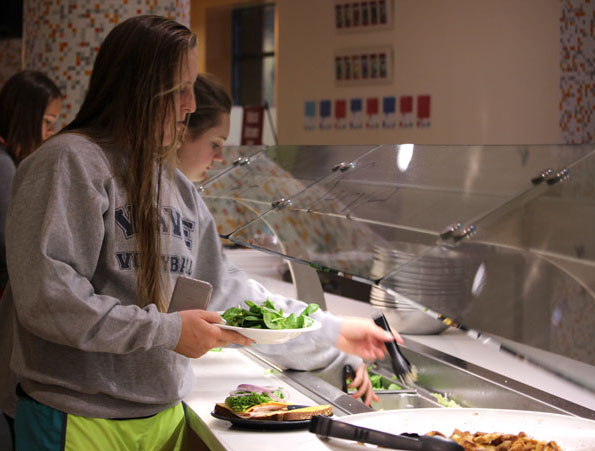“I feel like I live off of bagels and Goldfish.”
Emily Lovato, first-year communication sciences and disorders major, delved deeper into her concerns about Sutter Dining and the quality of nutrition she is receiving with her meal plan.
“It tastes like Disneyland food,” she said. “It just doesn’t feel like it’s made by real people.”

Following the discovery of a salamander in a student’s salad and rock-hard French toast, many students have voiced their concerns over the quality and cleanliness of Sutter Dining food.
After the salamander was found the establishment sent an e-mail to all first-year students declaring what had happened and the steps they were taking to fix the situation.
These steps included:
- Pulling the spring mix that it was found in immediately from all campus-dining locations
- Notifying the Butte County Health department, who confirmed the following day that Sutter Dining passed all inspections
- Contacting the vendor of the salad mix so that they could look into the level of quality control and report back
However, despite the immediate action taken by Sutter Dining, both of these incidences brought to light a common theme of student dissatisfaction.
Quality and cleanliness
According to Joe Bassett, residential dining manager, 14,000 to 16,000 meals come out of Sutter Dining every week.
However, some first-year students claim they go to the dining hall for only one meal a day.
“I’d say I eat there once a day,” said Nick Stojanovich, first-year agricultural business major. “Dinner is the best, but breakfast is horrible.”

Stojanovich enjoys the salad bar, but is now afraid to eat it because of the salamander incident, he said.
“We follow health department standards and procedures,” said Corinne Knapp, interim associate director for dining services. “All of our staff are serve safe manager certified.”
The establishment passed a health inspection the day after the incident and there were no violations found in the salad bar, she said.
“I would say that it’s just as shocking to us as the average person,” Knapp said. “We are doing everything in our power to ensure that it never happens again.”
Lack of food choices
Several first-year students have stated that the variety of food choices available at the dining hall are lacking.
“There’s three typical meals they serve and if we are going to be eating there the whole year, we are going to get tired of it,” said Austin Timsit, first-year business administration major.
Tyra Burks, first-year business administration major, also claims there are not enough protein options.

“I’m kind of scared to eat meat here,” she said. “I don’t remember the last time I had protein.”
According to Bassett, students are encouraged to speak with one of the managers on duty or write suggestions in the suggestion box addressing their main concerns about food variety.
However, of all the first-year students interviewed, none knew of the policy about speaking to resident advisers and managers about dietary restrictions or had seen a suggestion box.
“If they have one (suggestion box), it’s definitely in a place where you can’t see it,” Timsit said.
Additionally, some students have expressed that the managers and staff on duty are not approachable.
“I feel like there’s always at least one or two managers walking around or leaning against a wall staring at you,” Burks said. “It creeps me out when people watch me eat.”
A dislike of breakfast
With 35 million birds affected by the Avian Flu, the egg shortage has raised both cost and dissatisfaction at Sutter Dining with the temporary removal of the omelet bar.
Liquid eggs are still served Monday, Wednesday and Friday, according to Bassett.
“I know we’re in an egg shortage right now, but you can tell when eggs are made from a bag or not,” Lovato said. “It doesn’t taste like real food necessarily.”
With the price of each swipe in a meal plan costing around $9.50, some students are not finding enough options to fit the price.
“There should be more stations open during breakfast,” Tinsit said. “The cereal selection is great and I’m down for that, but it’s definitely not worth $9.50.”
The omelet bar was removed for cost reasons since the price of eggs has more than doubled since last semester, according to Knapp.
“As consumers we see it in the grocery store, but if you take the price of that egg and you times it by hundreds of eggs, the impact in dollars can be quite large for our operation,” she said.
Dining services hours and food policies
The hours for the establishment vary by day and have proved to be inconvenient for students.
According to Timsit, the dining hall is open in the day during times when he has class and then closed when he is out of class.
Additionally, the policy of food not leaving the dining hall is troublesome to students.
“We’re paying $9.50 for a swipe and we can’t even take out a sandwich for later,” said Jack McGinn, first-year business administration major. “My question is ‘why?’”
Lovato wants to take food out of the dining hall so that it does not go to waste, she said.
“What if I only eat half of my sandwich? I don’t want to throw it away,” she said.
The dining services rely heavily on the money from students paying for housing plans, so cost is a main reason for the rules and regulations, said David Stephen, director of University Housing and Food Service.
“Everything is cost-driven,” he said. “We are an auxiliary enterprise. We don’t get money from the university, the state or the governor.”
Overall, many students recognize the pros and cons that come with the dining services, but students still expect a certain level of quality and satisfaction that may not always be available.
“I feel like the people that work there try to do what they can,” Lovato said. “But it’s your job.”
Stephanie Schmieding can be reached at newseditor@theorion.com or @stephbottt on Twitter.






